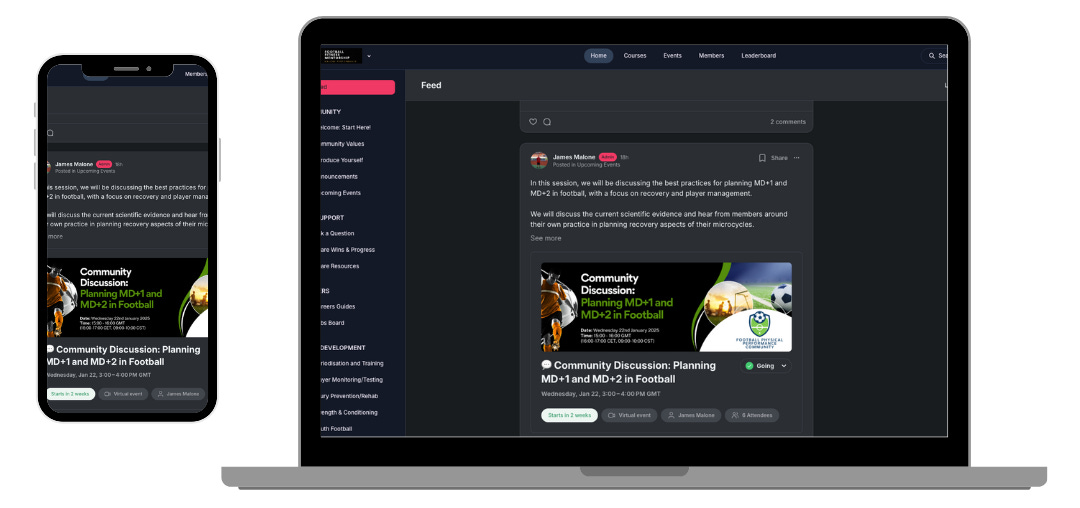What If Football Scrapped Sports Science?
A coach asked me recently, with more than a hint of scepticism:
“What would happen if we just got rid of all this sports science stuff?”
It’s a fair question - and one that’s worth answering properly. Let’s imagine what football would actually look like if we took sports science out of the picture entirely.
What Does “Sports Science” Really Mean?
First, we need to define what we'd be removing.
Sports science in football isn’t just a GPS tracker on a player's back. It's an entire support system.
It includes load monitoring (GPS, heart rate, RPE), strength and conditioning planning, injury risk screening and prevention, nutrition and hydration support, recovery strategies like sleep and travel scheduling, psychological skills training, and data-informed tactical and physical analysis.
If you removed all of this, you’d be left with coaching experience and guesswork - but none of the structured, evidence-based support that underpins the modern game.
Immediate Impact: Training Becomes Guesswork
If you take sports science away overnight, the first thing that collapses is objective load management.
Without GPS or RPE tracking, coaches wouldn’t know if players are accumulating excessive high-intensity running or whether they’re undertrained. Training intensity would rely entirely on the coach’s subjective impression - sometimes right, but often inconsistent or biased.
Periodisation, the art of planning training intensity over time, would lose its precision. Coaches might overtrain players in congested periods or ease off too much before critical matches. Elite football is demanding, with tight schedules and high physical loads. Without monitoring, managing cumulative fatigue becomes guesswork.
For players, this would mean training that is less tailored to their position, role, or individual needs. Return-to-play processes after injury would be less controlled. In short, the quality and safety of physical preparation would decline immediately.
The Injury Problem: A Predictable Spike
This is arguably the most damaging consequence of removing sports science.
Research consistently shows that structured injury-prevention work reduces injury risk - especially for muscle strains, which remain among the most common and costly injuries in football. The UEFA elite club injury group (Ekstrand et al. 2016) highlights that clubs who prioritise injury prevention have significantly fewer time-loss injuries.
Programmes like the FIFA 11+ have reduced injury rates by 30–50% in controlled trials. Similarly, studies of load management (Malone et al. 2018) show that spikes in high-speed running or training volume increase the risk of soft-tissue injuries. GPS, RPE, and other monitoring tools help avoid these spikes by tracking load over time.
Without these safeguards, players would face more hamstring, groin, and calf strains. Training absences would rise. Medical teams would be forced to deal with more reactive injury management rather than prevention. Over the course of a season, these injuries would cost clubs valuable player availability and, ultimately, results.
Reduced Quality in Physical Conditioning
Strength and conditioning programming would also suffer.
Without coordinated S&C planning, gym work would likely become generic, optional, or inconsistent. Some players would overdo strength work and risk overload or poor movement quality. Others would neglect it altogether, losing the resilience and power that high-level football demands.
Recovery strategies would also be left to chance. Nutrition support, hydration plans, sleep monitoring, and travel preparation all play critical roles in ensuring players are ready to perform. Without structured support, these areas often become neglected or inconsistent, especially in teams with busy travel schedules or congested fixture lists.
Players would simply be less prepared to meet the physical demands of elite football, especially over the long term.
Is There Anything to Gain from Removing It?
It’s fair to ask if there might be any positives.
Some coaches argue that removing sports science could reduce distractions and simplify training. Without pages of GPS reports and wellness scores, decisions would come down to the coach’s intuition and experience. There’s an argument that players might focus more on football-specific tactics and technique.
But this idea of “simplicity” is often an illusion. It doesn’t remove complexity - it just hides it. Without objective data, coaches still have to make the same decisions, but with worse information. Players still get tired. Injuries still happen. Travel still disrupts sleep and nutrition.
Elite teams aren’t looking to be overwhelmed by data - they’re trying to filter the noise to make better decisions.
Final Thoughts
Scrapping sports science wouldn’t mean returning to some mythical golden age of “real football”.
It would mean more injuries, less individualised preparation, poorer training quality, higher fatigue, and lower overall performance. It would mean coaches forced to rely on guesswork for critical decisions about player readiness and risk.
The clubs that kept their sports science infrastructure would quickly outperform those that abandoned it.
Sports science isn’t perfect - it can be overcomplicated, poorly communicated, or misused. But the solution isn’t to get rid of it. It’s to use it intelligently.
That's all for today.
See you next Friday.
James 🫡
🚀 Join The Football Performance Network
Take your career in football to the next level by joining a global community of 60+ physical performance practitioners.
As a member, you'll get:
✅ Direct 1:1 mentorship
✅ Weekly live events with industry-leading experts
✅ Practical, high-quality educational content
✅ A supportive network that understands your journey
Whether you're looking to grow your skills, make better decisions in your role, or build your career in elite football, this is the place to do it.
🔗 Join now and start learning, connecting, and progressing — together.




